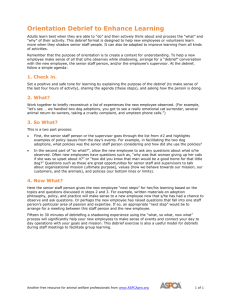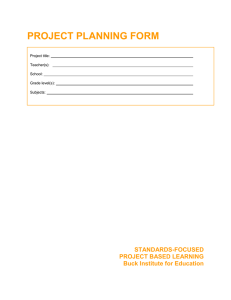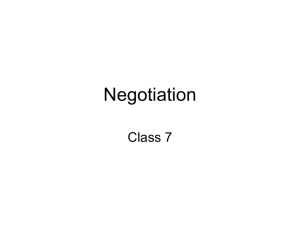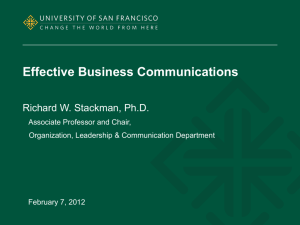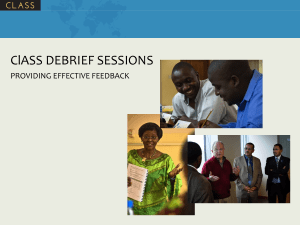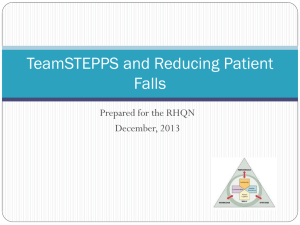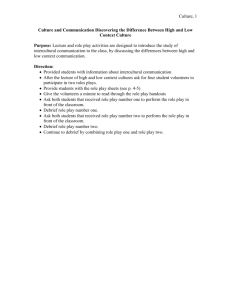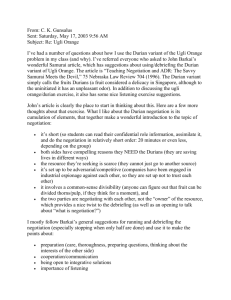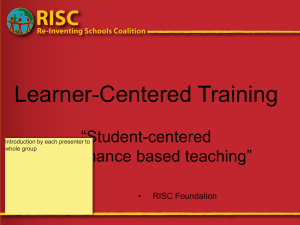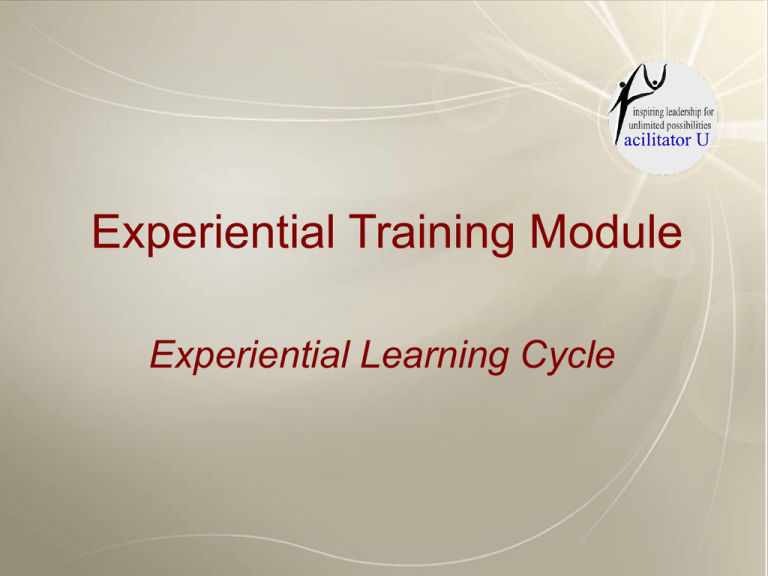
Experiential Training Module
Experiential Learning Cycle
Introductions
Share the following with your partner in one minute.
The person the farthest away from
Los Angeles, CA goes first.
Your name
Your location
How you plan to use what you
get from this seminar.
Switch roles.
2009. FacilitatorU.com. All rights reserved.
2
Large Group Feedback
Let’s hear from three of you.
Very succinctly, tell us who you are and how you
plan to use what you get from this seminar.
2009. FacilitatorU.com. All rights reserved.
3
Benefits of Kolb Learning Cycle
• Active engagement yields much higher learning
retention (75% vs. 5% for lecture)
• Can quickly open minds to new learning.
• Places responsibility for learning on participant.
• Accommodates all perceptual and processing
styles.
• Encourages pragmatic instruction.
• Infuses life into your curriculum.
• Helps make learning relevant to real life.
2009. FacilitatorU.com. All rights reserved.
4
Kolb Learning Cycle
2009. FacilitatorU.com. All rights reserved.
5
Let’s Do an Activity
Content Objective:
• To practice negotiation skills
Process Objectives:
• To learn how a partner activity is conducted.
• To show how productive work and learning can be
done virtually in small groups
• To learn something new about yourself in the
process
2009. FacilitatorU.com. All rights reserved.
6
The Ugli Orange Case
Instructions
(1) Introduce yourself to your partner
(2) Read your assigned role for the case
- One of you will play the role of Dr. Jones
- One of you will play the role of Dr. Roland
(5) Negotiate with your partner based on the
case study
Return to large group
2009. FacilitatorU.com. All rights reserved.
7
Activity Debrief
The Ugli Orange Case
•
What happened for you during this activity?
•
What was your experience like?
•
How do you feel about this experience?
•
Did you notice any familiar behavioral
patterns, in yourself or your partner?
2009. FacilitatorU.com. All rights reserved.
8
Generalize Learning
The Ugli Orange Case
•
•
How would you describe your approach to
communication during this activity?
What assumptions did you make during this
activity?
•
Is there anything you wished you’d done
differently?
•
How do you feel you did as a negotiator?
2009. FacilitatorU.com. All rights reserved.
9
Negotiation Basics
• In a conflict situation or negotiation, positions
are taken and stated in the form of demands.
• Positions are based on unexpressed interest.
• Interests are the needs, concerns, and values
that motivate each person.
• People take positions because they want their
interests satisfied.
• "Position" represents what the person wants;
"interest" represents why he/she wants it.
• Get to interests by probing into “why” something
is wanted then listen closely.
2009. FacilitatorU.com. All rights reserved.
10
Application
Share for one minute with your partner the
answer to the following question
How will you use what you just
learned from this point on?
Is there a commitment to action
you want to make?
When will you do it and who will you be
accountable to?
2009. FacilitatorU.com. All rights reserved.
11
Kolb Learning Theory
Concrete and Abstract Perceivers
• Concrete Perceivers absorb information through direct
experience—addressed by the “Activity” portion of the learning
cycle.
• Abstract Perceivers take in information through analysis,
observation, and thinking—addressed in the “Generalize” phase.
Active and Reflective Processors
• Active Processors make sense of an experience by
immediately using the new information—addressed in the
“Application” phase.
• Reflective Processors make sense of an experience by
reflecting and thinking about it—addressed in the “Analyze”
phase.
2009. FacilitatorU.com. All rights reserved.
12
Activity Considerations
•
Develop clear learning objectives/outcomes.
•
Design activities to maximize participation.
•
Design or choose activities to create some
tension or discomfort.
•
Prepare appropriate debriefing questions.
•
Prepare relevant teaching content.
•
Allow space for participants to provide content.
2009. FacilitatorU.com. All rights reserved.
13
Debrief
• Debrief according to activity objectives and
learning goals.
• Move from general to move specific while
staying on course.
• Push participants a little, but not too much.
• Use FAT as a questioning guide: Feelings,
Actions, Thoughts.
• Keep open-ended to bring out subtle
awareness, then move into next phase.
2009. FacilitatorU.com. All rights reserved.
14
Lessons Learned
• The same activity can be repeated to “apply”
learning from first time around.
• Different objectives can be met by the same
activity based on how the debrief and
learning phases are structured.
• There may be a tendency to skimp on the
debrief.
• Take enough time for the debrief and other
phases; this is where most learning occurs.
2009. FacilitatorU.com. All rights reserved.
15
Close
• Questions about the process.
• New technology on the horizon:
MaestroConference.com
• Requests for future modules?
• T/VM Teleclass coming May 25th.
• Thank you for participating!
2009. FacilitatorU.com. All rights reserved.
16

